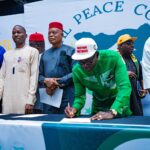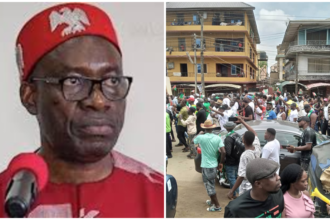
Prominent Islamic cleric Sheikh Ahmad Gumi has urged President Bola Ahmed Tinubu to take a firm and decisive stand against U.S. President Donald Trump following his recent remarks threatening possible military intervention in Nigeria.
In a strongly worded statement released on his verified Facebook page on Thursday, Sheikh Gumi described Trump’s comments as “an insult to Nigeria’s sovereignty” and “a challenge to the nation’s dignity and independence.” The cleric called on the Tinubu administration to summon the U.S. ambassador to Nigeria for an explanation and to demand an immediate retraction of what he described as a “reckless and demeaning statement.”
“For Trump to threaten a sovereign country with military attack is a profound disrespect to our authority. It is an affront to our independence and self-respect as a nation. But we can rise above it by standing firm and showing the world that Nigeria cannot be bullied,” Gumi wrote.
The cleric’s comments come amid escalating diplomatic tensions following Trump’s designation of Nigeria as a “Country of Particular Concern” (CPC) for what he called “mass killings of Christians” and “religious persecution” in parts of northern Nigeria.
On Friday, October 31, Trump had accused Nigerian authorities of failing to protect Christians and suggested that the U.S. “may have to intervene militarily to stop the slaughter.”
The remarks, made during a press briefing in Washington, D.C., have sparked outrage across Nigeria, drawing condemnation from religious leaders, political commentators, and civil society groups who view the statement as an unacceptable intrusion into Nigeria’s internal affairs.
Sheikh Gumi, known for his outspoken commentary on national security and governance issues, said the Federal Government must not take Trump’s comments lightly.
He insisted that failure to respond decisively would portray Nigeria as weak and submissive, especially given its historical role as a regional power and self-styled “Giant of Africa.”
“President Tinubu must defend Nigeria’s dignity. The U.S. has no moral or legal right to threaten a sovereign African nation with military aggression under any guise,” Gumi wrote. “If they (the U.S. government) do not retract their statements, Nigeria should sever diplomatic ties with this irresponsible regime. No country that respects itself will tolerate such insults.”
The Kaduna-based cleric further advised the Nigerian government to look beyond the United States for partnerships, suggesting that Nigeria has “many global options” for economic and military collaboration.
“Nigeria does not depend on America. There are many other nations we can work with for economic growth and defense cooperation. The world is not limited to the West,” he added.
President Trump’s comments have drawn widespread criticism both at home and abroad. His declaration of Nigeria as a Country of Particular Concern follows the reintroduction of a congressional bill—the Nigeria Religious Freedom Accountability Act of 2025—which proposes sanctions against Nigerian officials accused of violating religious freedoms or enforcing blasphemy laws.
During his address, Trump accused Nigerian leaders of “turning a blind eye to Christian persecution” and vowed to “take action to protect innocent lives.”
“Thousands of Christians are being slaughtered in Nigeria every year. If their government refuses to act, the United States will not stand by. We will act to defend them,” Trump declared, sparking uproar across Africa’s most populous nation.
The Nigerian government has yet to issue an official response to Trump’s statements. However, diplomatic sources in Abuja told journalists that the Ministry of Foreign Affairs is “monitoring the situation carefully” and would respond “appropriately at the diplomatic level.”
Gumi’s statement has further polarized public opinion, with some Nigerians backing his call for a tough response, while others caution against escalating the situation.
The Christian Association of Nigeria (CAN) said it welcomed international attention to the issue of religious violence but opposed any form of foreign military intervention.
“We appreciate global concern for the safety of Nigerian Christians, but no one should threaten our national sovereignty. Nigeria must address its problems internally, not through foreign occupation,” CAN said in a statement signed by its president, Archbishop Daniel Okoh.
Conversely, the Supreme Council for Islamic Affairs (NSCIA) described Trump’s comments as “reckless and Islamophobic,” insisting that religious conflicts in Nigeria are often exaggerated by foreign media.
“This attempt to portray Nigeria as a place of Christian persecution is a deliberate distortion. The United States has no right to threaten our people,” the NSCIA stated.
Civil society groups have also weighed in. The Centre for Democracy and Development (CDD) described Trump’s declaration as “unhelpful and provocative,” warning that it could inflame sectarian tensions at a time when Nigeria is grappling with security challenges in the North-East and Middle Belt.
“Statements like Trump’s risk worsening divisions within Nigeria and undermining ongoing peace-building efforts,” said Dr. Idayat Hassan, CDD’s Director.
Some analysts, however, have urged President Tinubu to handle the matter with diplomacy rather than confrontation.
Professor Jide Olagunju, an international relations expert at the University of Ibadan, said Nigeria must avoid being drawn into a political tussle with Washington.
“This is not the time for emotional diplomacy. The Tinubu administration should demand clarification through formal diplomatic channels, not through social media exchanges or press wars,” he advised.
Olagunju added that while Gumi’s position reflects patriotic outrage, “breaking ties with the United States would be impractical and detrimental to Nigeria’s interests.”
He pointed out that the U.S. remains Nigeria’s largest bilateral donor, providing nearly $700 million in development and humanitarian assistance annually.
“Nigeria relies on U.S. support in areas like counterterrorism, education, and public health. A diplomatic breakdown would have severe economic and security consequences,” he said.
Despite these cautions, Sheikh Gumi appears unmoved. In follow-up remarks, he accused Western powers of hypocrisy, noting that the U.S. often overlooks human rights abuses by its allies while intervening selectively in African nations.
“America cannot lecture anyone on human rights. They destroy countries in the name of democracy. Look at Iraq, Libya, and Afghanistan. We will not allow Nigeria to become another victim of their so-called humanitarian interventions,” Gumi wrote.
He called on Muslim and Christian leaders in Nigeria to unite against what he termed “foreign arrogance and manipulation.”
“Nigeria must unite as one people against any external threat. Whether Christian or Muslim, we are Nigerians first,” he said.
As of Friday evening, there were no reports that the U.S. ambassador to Nigeria had been summoned, though sources within the Ministry of Foreign Affairs said consultations were ongoing at the highest levels of government.
Diplomatic analysts predict that the issue may dominate Nigeria–U.S. relations in the coming weeks, especially as Washington continues to press for accountability over religious violence and the enforcement of blasphemy laws in the North.
For now, the Tinubu administration faces a delicate balancing act — defending Nigeria’s sovereignty while maintaining a critical partnership with one of its most powerful allies.
But for Sheikh Ahmad Gumi, the choice is clear:
“We either confront Trump’s insult with dignity or show the world that Nigeria has surrendered its independence. This is the time for courage,” he declared.
As tensions simmer, Nigeria’s foreign policy establishment must now decide whether to escalate, negotiate, or diplomatically defuse one of the most significant challenges to its sovereignty in recent years.






